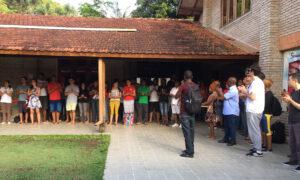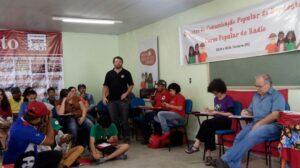Rooting the Movement: The Importance of Political Education/Formation
In 2017 Grassroots International launched the Global Peasant Solidarity Movement Building Initiative, a series of projects coordinated in collaboration with our partner the Landless Workers Movement/Movimento dos Trabalhadores Rurais Sem Terra (MST). This initiative, now in its second year, supports international social movements as they strengthen the infrastructure of regional learning centers, independent media production and popular communications classes, political education, and most of all, global solidarity.
At the National Florestan Fernandes School/Escola Nacional Florestan Fernandes (ENFF), just outside of the city of São Paulo, the Landless Workers Movement/Movimento dos Trabalhadores Rurais Sem Terra (MST). The MST has created a space where people from all over the country — and the world — can come to study both technical skills (such as agroecology and cooperative business models) as well as theoretical subjects like political theory, international geopolitics and the history of liberation movements. The MST was created to bring together landless peasants (small-scale farmers) to reclaim space to live and grow healthy food to sustain themselves and feed society. Considering that peasants produce 70% of the food that people eat around the world and that in the face of climate change small-scale farming cools the planet (compared to industrial farming that produces 44-57% of all greenhouse gas emissions), the role that peasants play is fundamentally connected to economics, politics, the environment and social wellbeing overall. This is why political education, along with collective work and mass action, is so fundamental to building a strongly rooted peasant movement.

For our partners, the importance of political education cannot be overstated. The term that is used in Latin America is political formation. It’s not a term that is easily translatable. Portuguese dictionaries define the word formação as a model of creation; education, instruction; a set of values or moral qualities resulting from education; a set of elements that form a body of troops. Political formation could be understood as an education of the mind, body and spirit to be able to fully engage in collective movement work. Through the Global Peasant Solidarity Movement Building Initiative (GPSMBI), Grassroots International has supported various projects which at their core are about political education and formation. Over 2,000 people participated in courses and conferences held at the ENFF last year, including courses on…
- Latin American political theory, whose focus was training leaders and social activists who are part of grassroots organizations and movements to build critical analyses of current contexts and to develop strategic action plans to transform reality towards one that is more just.
- Feminist Agroecology and Cooperation, whose focus is looking at agroecology and cooperative work through a feminist lens, promoting women’s leadership in agrarian reform settlements and encampments to produce a healthier and more just society.
- International Formation for Trainers Course, including participants from around 80 from people from five continents representing over fifty organizations. This is a two-month course which aims to build the capacity of trainers and leaders through in-depth study, exchange of experiences and cultures to strengthen internationalism.
The MST has many other locally based training centers throughout the country to support the needs of the different regions and to strengthen local capacity. These training centers provide courses similar to the ENFF, but on a local scale so that people who might not be able to travel to São Paulo still have the opportunity to deepen their technical and political education. Last year Grassroots supported projects in eleven different states to do renovations and improvements to the infrastructure of these regional training centers. These renovations are making it possible for the centers to have functional kitchens, ventilated dorms and classroom, updated plumbing and accommodations for teachers and staff.
For the Santa Dica Formation and Agroecology Production Center in Goiás, the renovations are being done by brigades of volunteers from MST settlements and encampments in the surrounding area. This process in and of itself is a form of political formation. The volunteers are divided into groups focussing on renovations, agroecological production, administration and education.
 At the Geraldo Garcia Center for Capacity Building and Research in Mato Grosso do Sul, they are renovating their kitchen and dormitories. “I am the son of settlement people, in encampment for five years, in the settlement for sixteen, and I live in this beautiful center” said Júlio Moretti, who has been part of the MST since he was nine years old. He shared with us how the space has been transformed over the years. “What used to be a space for only one family [wealthy landowners], through the work of a few has become a space of collectivity, study and inclusion. In 2002 we took advantage of the old structures at the center of the ranch to build our training center: brick walls were added to the sheds and became the plenary space and part of the sleeping quarters.” Speaking of the new ventilation system in the kitchen he said, “Going into the kitchen will no longer be a test of survival, but a flavorful pleasure, for the heat will only be in the food and not in the space that used to almost cook us.”
At the Geraldo Garcia Center for Capacity Building and Research in Mato Grosso do Sul, they are renovating their kitchen and dormitories. “I am the son of settlement people, in encampment for five years, in the settlement for sixteen, and I live in this beautiful center” said Júlio Moretti, who has been part of the MST since he was nine years old. He shared with us how the space has been transformed over the years. “What used to be a space for only one family [wealthy landowners], through the work of a few has become a space of collectivity, study and inclusion. In 2002 we took advantage of the old structures at the center of the ranch to build our training center: brick walls were added to the sheds and became the plenary space and part of the sleeping quarters.” Speaking of the new ventilation system in the kitchen he said, “Going into the kitchen will no longer be a test of survival, but a flavorful pleasure, for the heat will only be in the food and not in the space that used to almost cook us.”
All of these renovations will improve the ability of the centers to be spaces where people can come to learn, exchange experiences and build the movement together.


